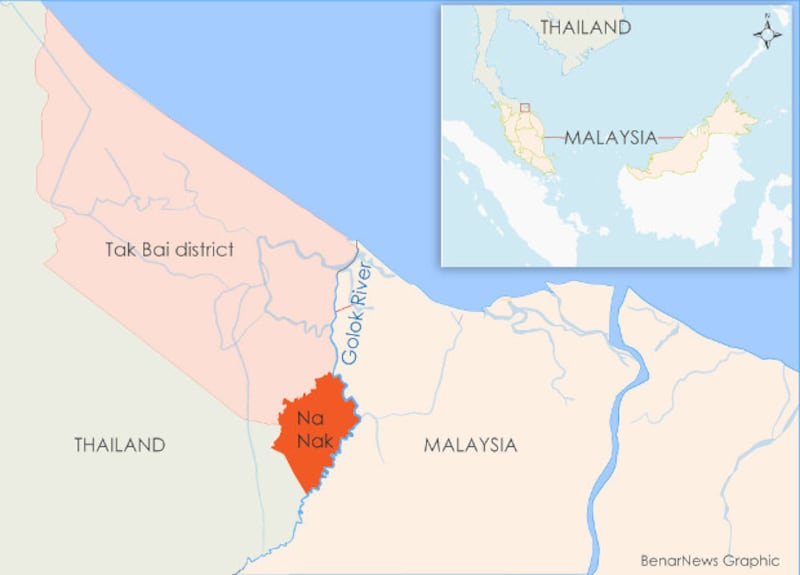Six border policemen were slightly injured Friday in an unusual attack in Thailand’s war-torn Deep South when suspected rebels detonated a bomb from the Malaysian side of a narrow river that separates the two countries, according to Thai authorities.
The late-afternoon attack occurred in Na Nak, a sub-district of Narathiwat province’s Tak Bai district that lies across the border from Kelantan state in Malaysia, when rebels standing on the Malaysian bank of the Golok River triggered the roadside bomb, Thai officials said.
The assailants had planted the improvised bomb on the road and connected it to wiring that stretched across the river to a detonator on the bank in Kelantan, officials said. The rebels set off the bomb on Thai soil in the village of Toyamoo as a truck carrying the border guards drove by.
“The assailants triggered a bomb to try to kill the BPP [Border Patrol Police Company] 4413 who were patrolling the street along the Golok River. ... We found pieces of improvised bomb near a water gate (on Thai side) and the trigger-wire ran across from Malaysian side,” said Capt. Boonsanit Khiewpradit, the deputy investigator at Tak Bai Police station.
Such an attack is rare, but leaders of rebel groups are believed to be hiding out on the Malaysian side of the border. Insurgents at times have crossed the frontier to carry out attacks on the Thai side before slipping back into Malaysian territory, according to Thai sources.
The six Thai border guards who sustained non-life threatening injuries on Friday included Lt. Capt. Manoch Kongsuk, the unit’s commander, who was cut under an eye and later sent for treatment at a hospital in the district, Boonsanit said.
“We came back from providing security at a village event, but when we arrived at the scene assailants who were hidden behind the brush on Malaysian soil triggered the bomb with a battery,” Manoch told reporters.
Recent attacks
Friday’s incident followed a week-long lull in violence in Thailand’s predominantly Muslim and Malay-speaking Deep South, where a separatist insurgency has raged for decades, killing close to 7,000 people since it flared up again in 2004.
Last week, in the deadliest attack on Thai security forces in at least two years, suspected insurgents killed six soldiers in a roadside ambush in Janae, another district of Narathiwat, and they tried to mutilate the bodies by setting them on fire, officials said.
In early April, 12 police officers were injured in an ambush by suspected rebels at a checkpoint in nearby Yala, another province in the Deep South. Since the start of the year, 36 people have been killed and another 44 injured in multiple attacks across Thailand’s southern border region, including Friday’s bombing in Tak Bai.
The attacks have occurred as Thailand’s military government has been negotiating with MARA Patani, a panel representing Deep South rebel groups, in meetings brokered by Malaysia that are aimed at re-opening formal peace talks.
Earlier this year, the warring sides agreed to a framework for setting up a limited ceasefire in the Deep South, but Barisan Revolusi Nasional, the largest of the rebel groups, has since rejected the current peace process. Experts believe that BRN is behind the recent cycle of violence.
River crossing
The Golok River, which is also known as the Kolok River, is where a suspected Islamic State (IS) member from Malaysia is believed to have fled across to Thailand as he escaped capture by Malaysian authorities.
This week, Malaysian Police Chief Khalid Abu Bakar announced that his department had arrested six suspected IS members in raids in several states of Malaysia between late March and late April. But a seventh suspect, Muhammad Muzaffa Arieff Junaidi, was believed to have escaped into Narathiwat province, Thailand, on March 22, Khalid said.
On Thursday, the chief immigration police in Narathiwat, said his department had records showing that Muzaffa had crossed into Thailand and returned to Malaysia “several times,” through a border checkpoint at Sungai Golok.
“The latest trip was on April 21 of this year. He has both countries’ immigration stamps. This happened before he was accused being an IS operative,” said Noppadol Rakchart, who heads the immigration police bureau in Narathiwat.

